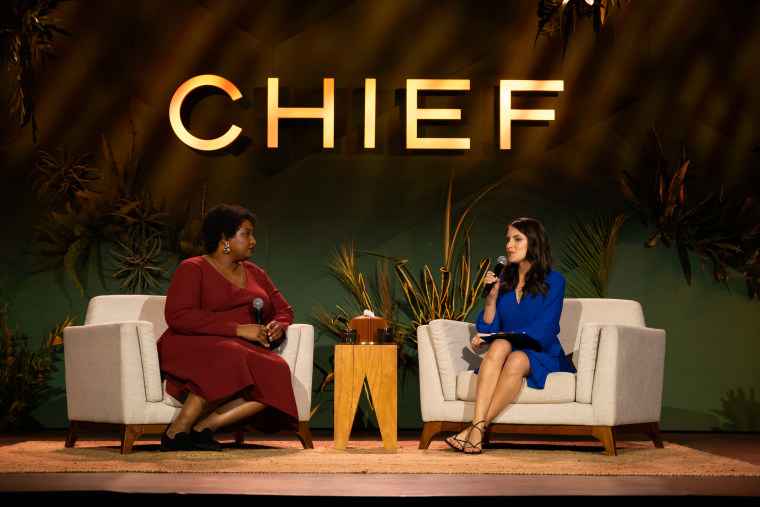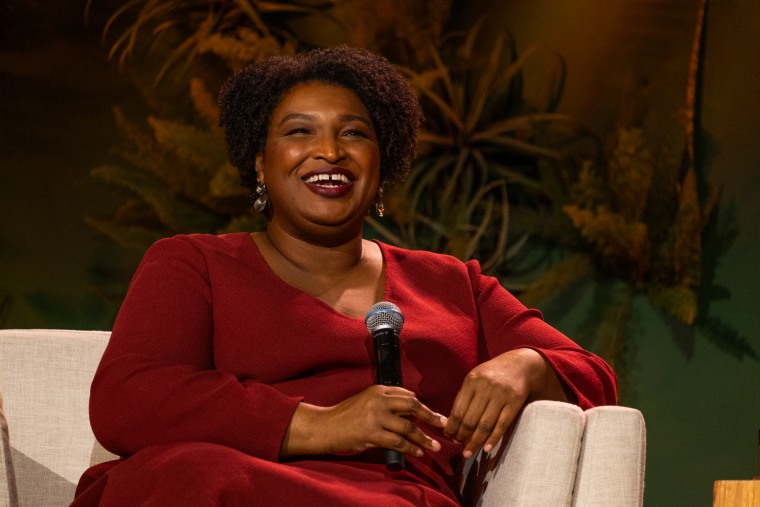It’s been almost a year since two-time gubernatorial candidate Stacey Abrams conceded to Republican Brian Kemp in Georgia’s race for governor. As the first Democratic nominee for the position, and the first Black woman to lead a major party’s gubernatorial ticket in the U.S., Abrams ran with the odds against her.
Despite losing that election (in addition to her first run for governor back in 2018 when she lost by just 55,000 votes), Abrams has left an indelible influence on Georgia politics -- and beyond.
Leading up to the 2020 presidential campaign, Abrams was a major force behind a large voter registration effort in Georgia, which helped grow the African-American vote by half a million people. Her effort to engage communities of color (particularly Black voters and young people) in the electoral process has since been lauded as a strong factor in flipping Georgia’s Senate to Democratic control, in addition to helping Joe Biden’s ascension into the White House. .
At a recent conference put together by the women’s leadership network, Chief, I had the opportunity to interview Abrams about everything from her time in office, her life outside of politics, and how leaders can effectively work towards meaningful change.
Here were some of the big takeaways from our conversation:
On remaining determined through tough times:
Abrams: “Optimism leaves you place for disappointment, and pessimism robs you of vision. If you don't think you can see anything bigger, you're never going to try. And if you never think something is going to fail, you take really dumb risks sometimes. I'm determined. And by that I mean I decide what my course should be. I do my research. I figure out what is driving me and then I just pursue it. And so, when the vicissitudes of life happen, when you stand for public office in a national way and people say “no,” if you're doing this out of optimism, you can be disappointed. If you're pessimistic about your choices, you could be crushed. If you're determined, then you remember that the reason you did it was the work that you wanted to get done … I can't control anyone else's behavior but my own. Optimism or pessimism lets the universe decide. Determination lets me decide. And so, I'm able to withstand some fairly public successes and failures because I was never operating for the universe. I was always trying to do the best I could with what I had with who I was at that moment.”

On dealing with setbacks:
Abrams: “Part of failure is that you excavate opportunity. And therefore, if you never stumble, if you never fall, you don't get close enough to dig. You can't dig deeper and find something new if you're never on the ground. And so, I don't see loss or failure as an indictment of me. I think it's a learning opportunity.
…When I ran for governor a second time, it was not out of naivete and it wasn't out of a sense that I had the right to it. It was because the ‘why’ remained, the things that drove me the first time had not been solved. And therefore, I tried again. And as long as the ‘why’ is there, whether it's in business or in politics or in your civic life, stumbling and resetting has to be a part of your ecosystem because who else is going to do it, who else is going to care in the unique way that you will?”
On making your voice count:
Abrams: “Sometimes we have to write our own story. We have to write ourselves into places.
I tell a story in [my book] “Lead from the Outside” about when I was a student at Spelman. The board of trustees was meeting to raise my tuition, but they were not going to raise my scholarship, and I was not going to be able to raise the money. And I saw that there was a sign that the board of trustees was meeting, so I had on my cleanest jeans and my nicest T-shirt, and I took myself to the Board of Trustees meeting.
…I said, ‘I'd like to talk to the board’. And the secretary of the college is like, ‘I don't think you can do that’. And I said, ‘I looked in the handbook, it didn't say I can't.’
And I sat down at the big board table and this guy who was sitting next to me who was still trying to figure how I got in the room … And I advocated, I said, ‘Look, you guys can … raise tuition, but you're going to lose a lot of students. We don't have the resources to stay here … and for the first time, apparently in a lot of years, they agreed not to raise tuition that year.
There was no logical reason for me to think that addressing that route of powerful people was going to work. But they were never going to invite me in, to tell my truth. They were never going to ask for my opinion. And we've got to stop waiting for people to ask us for our opinions. We have to be willing to tell them what they need to know and help them figure out what to do with it.”
On using your power to create change
Abrams: Women “have to share power with others. You bring people with you, so they know what's out there. You share what you learn so they can do it again. Because often when we find the secret sauce, when we make it into the room, we are so proud of ourselves that we don't want anyone else to know we know the knock. But if other people know the knock, they either have to find a bigger building or they've got to let the rest of us in. And so, as we think about power for women who've already figured out a bunch of secret knocks, your opportunity is to use the power you have and don’t be afraid that using it will cause you to lose it.”
